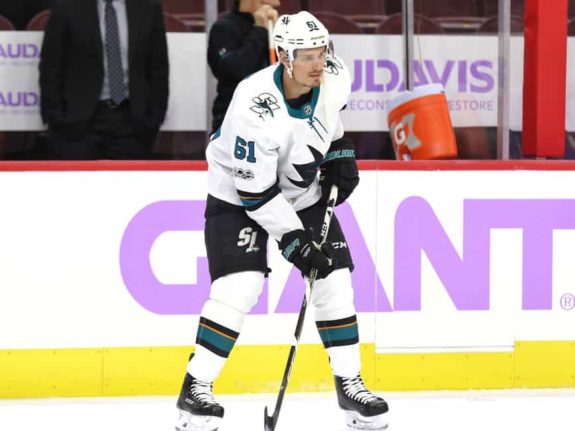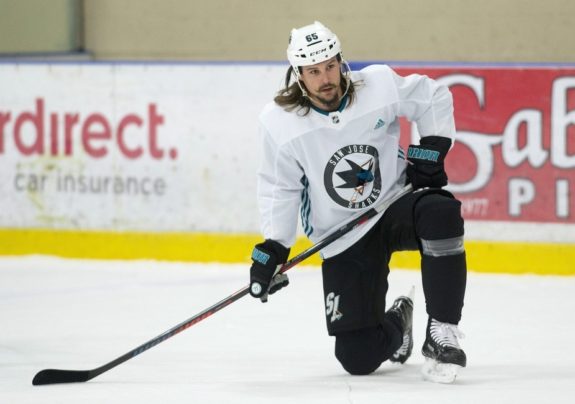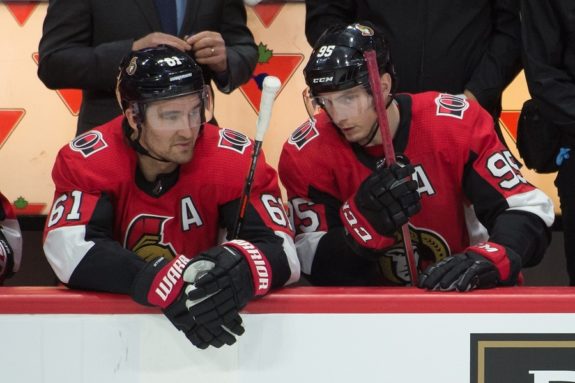The San Jose Sharks, led by general manager Doug Wilson, are expected to be buyers at the trade deadline – now less than two weeks away. The Sharks will gladly trade a bit of future for a run now at the Stanley Cup.
The Sharks are not alone. Teams divide into two camps around this time. There are buyers, teams who believe a Stanley Cup run is possible and are willing to sacrifice some future potential for a better result this season. And sellers, teams who don’t see a Stanley Cup run this season and want to acquire assets to improve their team’s future.

Trade deadline moves have common characteristics. Buyers part with assets which are not core to a Stanley Cup run. This includes lower-end players, draft picks and prospects. In some cases, salary cap space plays a role. Buyers want players who make the current team better. If possible, they’d like a splashy trade involving a difference-maker, someone whose high-end skills make the buyer a much better team.
Sellers want acquisitions which create value for next season and beyond. They want draft picks, prospects and, for the most part, younger players. Among these, high draft picks are the most coveted. Sellers commonly trade players on expiring contracts who are not expected to re-sign. A subset of these players are potential difference-makers.
The Sharks’ Challenge
The Sharks have a major problem when it comes to adding a difference-maker. Trading a key player from this season’s team for another key player on someone else’s team is tough to do and not very likely. I’ve identified Justin Braun as the most-likely candidate, but it is unlikely he’ll garner a difference-making player in return.

This leaves draft picks and promising prospects, which is fine if you’ve got them. The Sharks have a good AHL team, but their prospect pool is unlikely to get them a difference-making player (Ryan Merkley is the Sharks’ lone high-end prospect).
In almost every deal in which a difference-maker changes hands near the trade deadline, high draft picks are involved (considered either first or second round picks). The Sharks have already committed their near-future high draft picks elsewhere. They’ve actually over-committed them, due to ‘conditions’ on several draft picks.
The Untradable Draft Picks
The Sharks no longer own or are ineligible to trade most of their high draft picks for the next few years. The details are not simple. Two trades factor in. In one trade, the Sharks acquired Evander Kane from the Buffalo Sabres. The Sharks gave the Sabres their 2019 first-round draft pick, but if the Sharks miss the playoffs, they can give up their 2020 first-round pick instead.
In the other trade, the Sharks acquired Erik Karlsson from the Ottawa Senators, and nothing is simple. The Sharks gave up players, prospects and the following high draft picks.
- a conditional first-round pick, between now and 2022, if Karlsson is on an Eastern Conference roster this season.
- a 2019 second-round pick, which is the higher of the second-round picks San Jose holds (their own and the Florida Panthers pick).
- Ottawa gets the Sharks’ 2020 first-round pick if the Sharks make the playoffs, the 2019 first-round pick if they miss.
- The Sharks give their 2021 second-round pick if Karlsson re-signs with the Sharks. It becomes a first-round pick in 2021 if the Sharks advance to the Stanley Cup Final this season.
The Sharks will give up multiple draft picks to Ottawa. They have committed to Ottawa a ‘superset’ of seven draft picks, though only a ‘subset’, between two and four draft picks, will ultimately change hands. The specific draft picks are conditioned on events yet to happen.

When it comes to trading draft picks, the Sharks are constrained by the superset of seven. The net result? As of now, the only high draft pick San Jose can trade in the next three years is their 2020 second-round pick. The others are either already gone or have conditions on them which prevent them from being used in a trade. Only after the conditions are met will we know which picks San Jose will keep and which will go to Ottawa.
The Sharks Workaround
With so many draft picks already gone or tied up, the Sharks lack the assets needed to make a splashy deal. Or do they?
In logic (Boolean and otherwise), there is are simple words at the core. One is and; another is or. There are also statements forms, including the if … then statement (if ‘this’ happens, then ‘that’ happens). There is plenty of this logic embedded in the Karlsson trade.
And if one uses logic, there is exactly one trade partner which makes sense if San Jose wants a difference-maker.
The Difference-Maker Trade Partner
The team San Jose can trade with is Ottawa. Ottawa is clearly a seller. San Jose can, in effect, trade the or and if … then parts of the Karlsson deal. They can turn ‘conditionals’ into specific commitments. In essence, the Senators can lock down the more favorable portions of the Karlsson trade by trading with the Sharks now.
A Sharks-Senators Trade
One trade comes to mind involving one of the conditional elements. The Sharks can give up something minimal to Ottawa in exchange for certainly. Ottawa gets the Panthers’ 2019 second-round pick instead of the the higher of either the Panthers or Sharks’ second-round pick.
The standings make this easy. The condition is based on where San Jose finishes relative to Florida in the standings this season. It is almost certain San Jose finishes ahead of Florida, meaning the Florida pick will be better for Ottawa.
Ottawa has very little risk in this. Even if the highly improbable happens, they lose very little (a few draft spots). For taking the highly improbably off the table, Ottawa gets a bit of compensation, perhaps a seventh-round draft pick.
For San Jose, it replaces a condition with a certainty. An or from the Karlsson trade disappears and frees up the Sharks’ 2019 second-round pick for use in a separate trade.
Ottawa’s Offerings
Most likely, the Sharks will look for a direct trade with Ottawa instead of hoping for a multi-part deal, though I won’t rule out the possibility of a more complex deal.
Trading directly with Ottawa can net the Sharks a game-changer. The Senators have two such players who are subject to trade rumors: Matt Duchene and Mark Stone. Duchene, a centerman, fits the Sharks. He is averaging more than a point-per-game and offers up an improvement in an area the Sharks could use one, the faceoff circle.

Stone, a winger, is an excellent goal-scorer. He is also averaging a point-per-game. Importantly, he’s a right winger which complements the Sharks, a team loaded on the left side. It’d be less of a stretch to acquire Ryan Dzingel, a lesser talent, but still an effective player. Like Stone and Duchene, Dzingel is above the 20-goal mark for the season.
Ottawa’s Extra Incentive
There is a detail in the Karlsson trade which give the Senators reason to help the Sharks this season. If the Sharks make the Stanley Cup Final this season, Ottawa nets a 2021 first-round pick instead of 2021 second-round pick. This gives Ottawa a significant incentive to help the Sharks – and a disincentive to help their Western Conference rivals.
If the Senators help another Western Conference team in a trade, they are lessening their own chances at getting the Sharks’ first-round pick and increasing the chances they get the second-round pick. Conversely, helping the Sharks now increases their odds at getting the Sharks’ 2021 first-round pick.
The Senators are Sharks fans in 2019 – and not fans of any other Western playoff contender.
A Deal?
Perhaps the Sharks and Senators can strike a deal along the following lines. First, change the or to an and for the 2019 second round selections. Ottawa gets both, not one or the other. Second, offer the Sharks’ 2020 second-round pick. In return, San Jose gets Stone. Are a pair of second round picks enough? Not normally. But Stone improves San Jose’s chances of making the Stanley Cup Final, which improves Ottawa’s chances of getting the 2021 pick upgraded to round one from the second round, which makes the deal more attractive to the Senators.
Mutual Opportunity
Ottawa and San Jose have plenty of unique win-win scenarios in a trade deadline move.
For the Sharks to acquire a difference-maker, one team and only one team, holds the key: the Senators. Whether it is a direct trade, a three-way trade or some other creative alternative, the reality comes down to this. Any Sharks trade involving a difference-maker is going through the Senators.